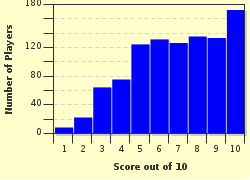Quiz Answer Key and Fun Facts
1. A love of adventure led Robert Scott to explore Antarctica in the hope of being the first man to reach the South Pole. Which of these birds was his second name?
2. Patriotism, or love of one's country, led many brave men and women to volunteer for undercover work in occupied Europe during World War 2. The missions were organised by the SOE, which stands for what?
3. The Holy Roman Empire lasted for centuries and the emperors loved their power (such as it was). Which of these names was never used by a Holy Roman Emperor?
4. Napoleon Bonaparte could be said to be motivated by love of glory. He was defeated at the Battle of Waterloo in which year?
5. Love of religion featured in the Gunpowder Plot of 1605. Although Guy Fawkes is most often remembered in connection with the plan, what was the name of the ringleader?
6. Historically, Royalty does not marry for love, but for dynastic reasons, with love provided by their mistresses. Exceptionally, Katherine Swynford, after being his long term mistress, eventually became the third wife of which of these men?
7. Love of their fellow man has motivated many people to work as missionaries in countries not their own. Which of these does NOT fit that category?
8. Joan of Arc's love for France led her to become a French national heroine and to her death at the age of only nineteen at the hands of the English. She is also known as the 'Maid of' which of these places?
9. A love of money has led to many crimes. Which of these did Colonel Blood nearly succeed in stealing in 1671?
10. Love for a country other than one's own has led many people to act as spies. Three of these are known for spying on behalf of the Soviet Union/Russia. Who is the odd one out?
Source: Author
rossian
This quiz was reviewed by FunTrivia editor
bloomsby before going online.
Any errors found in FunTrivia content are routinely corrected through our feedback system.

